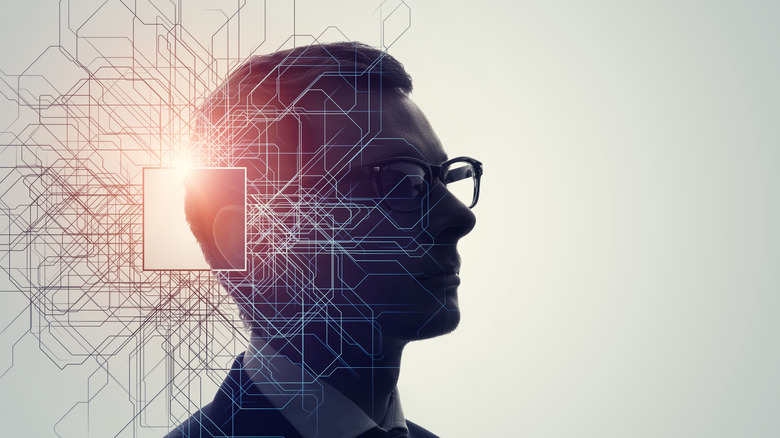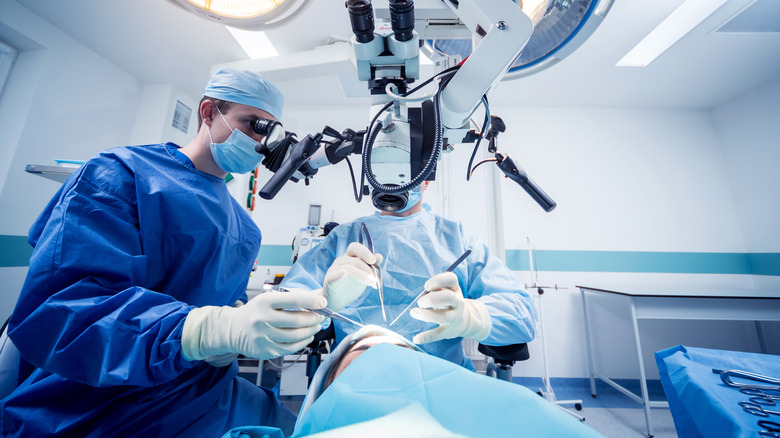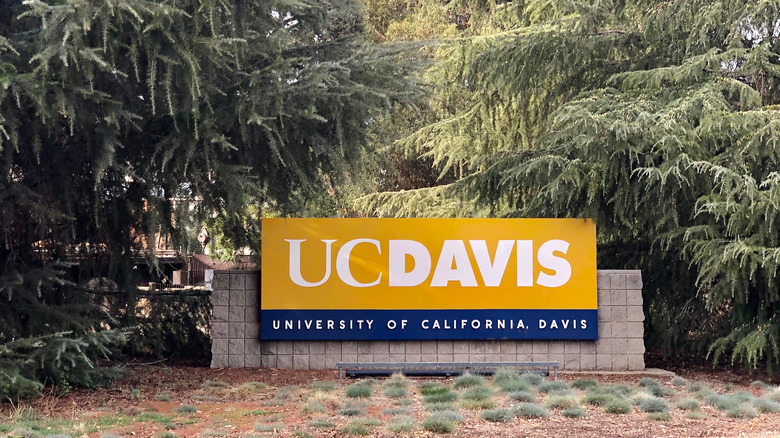These Are The Concerns Experts Have Over Elon Musk's Neuralink
Like colonizing Mars or traveling in tubes, the idea of a brain chip that allows people to overcome disability, expand their cognitive abilities, and interface with electronic devices would have an almost immeasurable impact on everyday life. Despite comparisons with the kind of technological dystopias you see in shows like Black Mirror, there are likely to be plenty of willing customers should Elon Musk's Neuralink ever launch.
The people who Neuralink initially wants to reach, and potentially the people who would benefit most from the technology, are individuals with severe physical impairments. Musk claims the chip could allow quadriplegics to use their limbs again, and help individuals with brain injuries communicate.
Beyond helping those with physical impairments, there is the idea that Neuralink could act as a standard piece of tech anyone can use. It has been claimed that Neuralink could one day be installed quickly and painlessly in a doctor's office. Neuralink users could then use their brain chip for everything they currently use their phones for. They could stream music directly into their brains, change what's playing on their TV, and even upload memories directly to the cloud.
However, while this all sounds good on paper, there are some very real issues standing between Neuralink and the grey matter Musk wants to implant it in. The FDA has yet to grant approval for human testing, meaning the chip has not progressed past the animal testing phase. The exact reason why is unknown, and the FDA won't even confirm if an application to have the chip tested exists. But there could be any number of reasons, both practical and ethical, causing Neuralink to stall.
Experts consider the concept far fetched
Dr. John Adler, Emeritus Dorothy and Thye King Chan Professor of Neurosurgery and Radiation Oncology at Stanford, states he has an admiration for Musk — but also has some very strong doubts about the Neuralink project as a whole. Dr. Adler believes that while Musk has "proven his critics wrong" many times before, he will have "met more than his match," when it comes to his plans for Neuralink.
Regulation is one area where Dr. Adler believes Neuralink will struggle. He believes that the government and FDA will prevent chips from being implanted in anyone who doesn't suffer from neurological problems "any time soon." Speaking to SlashGear, the professor says that: "It is imaginary thinking for such implants to happen. Non-medical people have no idea how hard it is to effect change in healthcare." With regards to when something like Neuralink could be allowed, the highly decorated neurosurgery expert stated it was possible in 50 years — but even then he "would not hold his breath."
The government may not be the obstacle in the way of Neuralink's progress. There are also a number of medical barriers that make the device impractical. As with the regulatory issues, Dr. Adler doesn't believe the medical barriers are going to be surpassed in the near future. He told Slashgear: "I think the biology is decades from allowing us to place electrodes on/within the brain that don't scar over and stop working."
If Dr. Adler is correct, there is little chance of us seeing a functional, widely available, version of Neuralink within most of our lifetimes. Musk's optimistic vision for the device is as far-fetched as the idea of terraforming Mars with a well-placed nuke.
Animal welfare issues have raised ethical questions
Neuralink has received heavy criticism for its treatment of animals during the chip's testing process. While the animal tests have demonstrated the progress and viability of the device — a lot of animals have died and questions have been raised regarding the methods used.
Following the release of data from UC Davis that suggests monkeys were injured and killed during Neuralink's experiments, the company released a statement that it says provides "proper context." The blog post acknowledges eight "animals" were euthanized during the studies. Two were killed at a pre-planned time to "gather important histological data" and a further six were destroyed "at the medical advice of the veterinary staff at UC Davis." Of the six, one animal suffered a complication related to "Bioglue," one animal's device "failed," and the remaining four developed infections.
The Physicians Committee for Responsible Medicine (PCRM) tells a different story. While speaking to SlashGear, Jeremy Beckham, the non-profit's research advocacy coordinator, slammed the suggestion only eight animals had died as "simply false." Beckham points to the data PCRM received from UC Davis that suggests at least 14 monkeys had died during Neuralink's experiments. A question mark hangs over two additional monkeys due to incomplete or unclear data. Beckham suggests that rather than eight "animals" in total meeting their end due to a Neuralink implant — every single monkey that had a chip implanted has died as a result.
The data provided by UC Davis also suggests two monkeys have died due to the application of Bioglue, which Beckham describes as a "known neurotoxin" that "should not be used in the way Neuralink staff used it." Beckham's claims are also backed up by a study published in the Journal of Surgical Research which concluded that Bioglue damages nerve tissue.
There are also doubts about the company's transparency
Part of Neuralink's reaction to questions about their animal welfare practices involved building, and subsequently moving to, a purpose-built "6,000 sq ft vivarium" that is staffed by "caretakers who are passionate about animal well-being." Neuralink claims the facilities at UC Davis meet federal standards, but the company "wanted to improve upon these standards." Records from UC Davis suggest that the seven remaining monkeys from Neuralink's experiments were shipped to the new facility.
However, Jeremy Beckham suggests a more sinister motive could be behind the move. He points out that, as a public facility, UC Davis is bound by transparency laws that require public institutions to disclose information about what happens in their facility. It was these laws that allowed PCRM to obtain the data which cast doubt on Neuralink's animal welfare record in the first place. Not only do these laws allow you to obtain data from public institutions, but they also ensure the quality of that data is sufficient. Due to some sections of the data PCRM received being confusing or incomplete, including data about the medical history and ultimate fate of two monkeys, the non-profit is currently engaged in a lawsuit against the university.
After moving to a privately owned facility, Neuralink's records are now private too. Beckham highlights the difference in transparency between experiments conducted at a publicly owned institution, and Neuralink's new, private, facility: "Neuralink can just selectively release whatever photographs they want, whatever information they want, to try and put themselves in the most positive light possible."
SlashGear has contacted Neuralink for comment on the issues raised in this article. We have yet to receive a reply.



